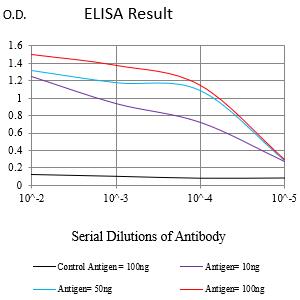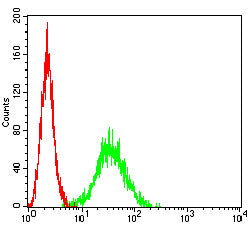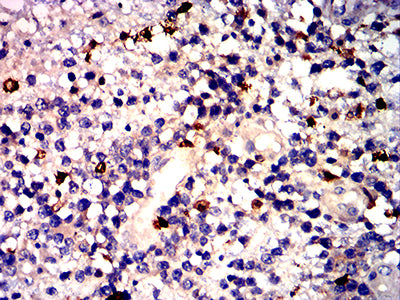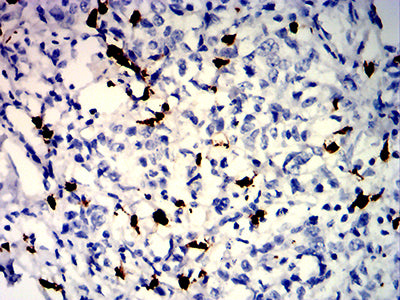



| WB | 咨询技术 | Human,Mouse,Rat |
| IF | 咨询技术 | Human,Mouse,Rat |
| IHC | 1/40-1/200 | Human,Mouse,Rat |
| ICC | 技术咨询 | Human,Mouse,Rat |
| FCM | 咨询技术 | Human,Mouse,Rat |
| Elisa | 1/5000-1/10000 | Human,Mouse,Rat |
| Aliases | MIF; NIF; P14; CAGB; CFAG; CGLB; L1AG; LIAG; MRP14; 60B8AG; MAC387 |
| Entrez GeneID | 6280 |
| clone | 3A1H2 |
| WB Predicted band size | 13.2kDa |
| Host/Isotype | Mouse IgG1 |
| Antibody Type | Primary antibody |
| Storage | Store at 4°C short term. Aliquot and store at -20°C long term. Avoid freeze/thaw cycles. |
| Species Reactivity | Human |
| Immunogen | Purified recombinant fragment of human S100A9 (AA: 1-114) expressed in E. Coli. |
| Formulation | Purified antibody in PBS with 0.05% sodium azide |
+ +
以下是关于HNF4A抗体的3篇参考文献示例,包含文献名称、作者及简要摘要内容:
---
1. **文献名称**:*"Hepatocyte Nuclear Factor 4 Alpha (HNF4A) Regulates Liver-Specific Gene Networks through Chromatin Remodeling"*
**作者**:Li, J. et al.
**摘要**:本研究利用HNF4A特异性抗体进行染色质免疫沉淀测序(ChIP-seq),揭示了HNF4A在肝脏细胞中通过结合特定启动子区域调控代谢相关基因的机制。实验表明,HNF4A缺失导致脂质代谢紊乱,抗体验证了其在染色质重塑中的核心作用。
2. **文献名称**:*"HNF4A Antibody-Based Detection of Nuclear Expression in Colorectal Cancer Tissues"*
**作者**:Smith, K.L. & García, R.
**摘要**:通过免疫组织化学(IHC)结合HNF4A抗体,研究发现结肠癌组织中HNF4A核表达显著降低,且与患者预后不良相关。抗体特异性通过siRNA敲低实验验证,支持HNF4A作为潜在抑癌基因的作用。
3. **文献名称**:*"Functional Characterization of HNF4A Mutations in Maturity-Onset Diabetes of the Young (MODY1)"*
**作者**:Wang, X. et al.
**摘要**:利用HNF4A抗体进行Western blot和免疫荧光分析,发现MODY1相关突变体导致HNF4A核定位异常及转录活性下降,揭示了其通过干扰胰岛素分泌通路引发糖尿病的机制。
---
以上文献示例概括了HNF4A抗体在基因调控、癌症研究和疾病模型中的典型应用。实际文献需通过数据库(如PubMed)检索获取完整信息。
The hepatocyte nuclear factor 4 alpha (HNF4A) is a transcription factor belonging to the nuclear receptor superfamily, primarily expressed in the liver, pancreas, kidney, and intestines. It plays a critical role in embryonic development, tissue-specific gene regulation, and metabolic homeostasis, particularly in glucose, lipid, and drug metabolism. HNF4A binds DNA as a homodimer, regulating the expression of genes involved in bile acid synthesis, blood coagulation, and mitochondrial function. Dysregulation of HNF4A is linked to metabolic disorders, including maturity-onset diabetes of the young (MODY1), hepatic steatosis, and hepatocellular carcinoma.
HNF4A antibodies are immunological tools designed to detect and quantify HNF4A protein levels in research and diagnostic applications. They are widely used in techniques like Western blotting, immunohistochemistry, chromatin immunoprecipitation (ChIP), and immunofluorescence to study HNF4A's expression patterns, subcellular localization, and interactions with target genes. Specific HNF4A isoforms (e.g., HNF4α1 and HNF4α2) may be distinguished using isoform-specific antibodies, aiding in research on their distinct biological roles.
In clinical contexts, HNF4A antibodies help identify mutations or aberrant expression in genetic screening for MODY1 or liver diseases. Their utility extends to studying mechanisms of hepatocarcinogenesis and evaluating therapeutic interventions targeting metabolic pathways. Validation of these antibodies for specificity and cross-reactivity is essential, given the structural similarities among nuclear receptor family members.
×